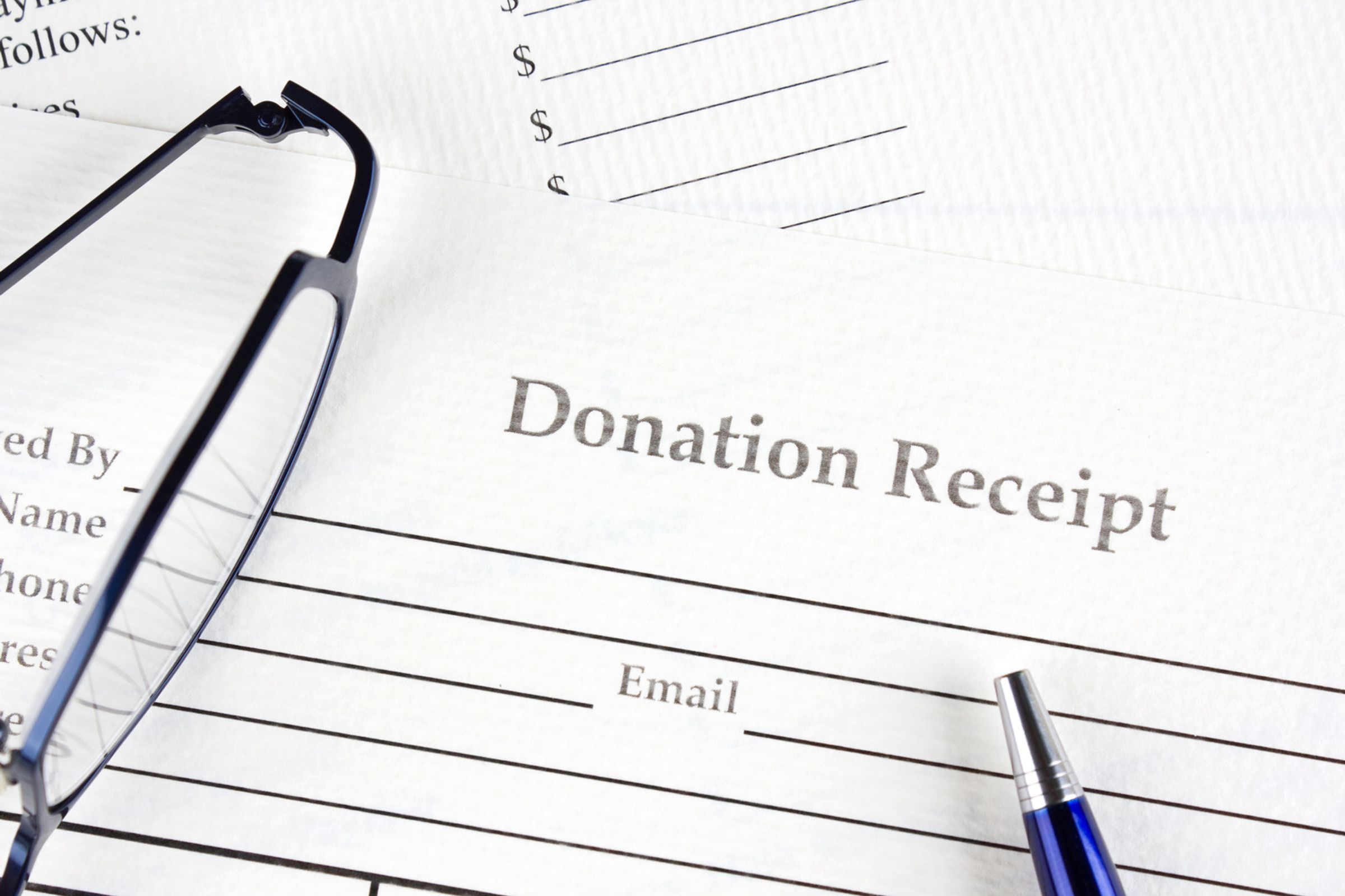Select and customize the fundraising method best suited for your organization
BetterWorld seamlessly integrates with both online and in-person auctions
Impress donors with creative raffle items and elegant online raffles
Create attractive donation pages that maximize donor impact and boost online giving
How Donation Receipts Enhance Nonprofit Accountability
By Whit Hunter

Accountability is paramount with more and more people donating online these days. In the digital age, where online giving is becoming increasingly prevalent, the need for accountability has never been greater. The humble online donation receipt emerges as a key instrument in fulfilling this accountability.
But what's a donation receipt, you ask? And how does it help nonprofits be more accountable?
Understanding Donation Receipts
A donation receipt is a document provided by a nonprofit organization to a donor as an acknowledgment of their contribution. It typically includes essential information such as:
- Organization's Name: The donation receipt includes the name of the nonprofit organization that received the donation.
- Donation Amount: It specifies the exact amount of the donation made by the donor.
- Date of the Donation: The receipt indicates the date on which the donation was made by the donor.
- Confirmation Statement: It includes a statement confirming that the donor did not receive any goods or services in exchange for their donation.
These donation receipts play a significant role for both donors and nonprofits. They provide donors with tangible evidence of their charitable giving, which can be important for personal record-keeping and for claiming tax deductions. To qualify for tax-exempt status, an organization must be structured and function in accordance with one of the following purposes, as outlined in tax laws:
- Religious
- Charitable
- Scientific
- Testing for public safety
- Literary
- Educational
- National or international sports competitions
- Prevention of cruelty to children and animal
- Corporations who hold and collect income from property to turn over to an exempt organization
- Certain civic leagues or organizations
- Labor, agricultural, or horticultural organizations
- Certain business leagues, boards of trade, real estate boards, and not-for-profit professional football leagues
- Recreation and pleasure activity clubs
- Voluntary employees' beneficiary associations
- Certain fraternal benefits orders
- Certain local teachers' retirement fund associations
- Specific local life insurance associations
- Other organizations, associations, trusts, or other structures operating without profit
Donation receipts help ensure compliance with nonprofit tax regulations and provide documentation of all contributions received.
Importance of Donation Receipts
- Transparency: Donation receipts promote transparency by providing clear documentation of every contribution received. This transparency helps build trust with donors, demonstrating that their contributions are being used as intended.
- Legal Compliance: Donation receipts are often required for tax purposes, especially for donors who wish to claim deductions on their tax returns. Nonprofits must adhere to specific guidelines set forth by tax authorities to ensure their receipts are compliant.
- Record-Keeping: Donation receipts serve as a valuable tool for record-keeping. They help nonprofits keep track of all incoming donations, which is crucial for financial management, budgeting, and reporting purposes.
Enhancing Nonprofit Accountability
Now let's delve deeper into how donation receipts enhance nonprofit accountability:
- Providing Proof of DonationDonation receipts provide donors with tangible proof of their contribution. This documentation reassures donors that their support has been received and acknowledged by the nonprofit. Without a receipt, donors may feel uncertain about whether their donation was properly received and recorded.(Imagine you donate $100 to a local animal shelter through their online fundraising platform. Upon receiving your donation, the shelter sends you a donation receipt via email, confirming the details of your contribution. This receipt gives you peace of mind, knowing that your donation has been officially acknowledged.)
- Ensuring Accuracy and TransparencyBy issuing donation receipts, nonprofits ensure the accuracy and transparency of their financial records. Each receipt serves as a written record of a transaction, detailing the amount donated and the date of the contribution. This level of transparency fosters trust between the nonprofit and its donors.(A donor decides to support a charity's campaign to provide clean water to communities in need. After making an online donation of $50, they promptly receive a donation receipt that outlines the specific project their contribution will support. This transparency reinforces the donor's confidence in the organization's mission and goals.)
- Facilitating Tax ComplianceDonation receipts play a crucial role in facilitating tax compliance for both donors and nonprofits. For donors, having a valid receipt is often a requirement for claiming tax deductions on charitable contributions. Nonprofits, on the other hand, must ensure their receipts meet the necessary legal standards to support their donors' tax claims.(An individual donates $200 to a nonprofit organization dedicated to environmental conservation. At the end of the year, they use the donation receipt provided by the organization to claim a tax deduction on their annual tax return. The receipt serves as evidence of their charitable contribution and helps them comply with tax regulations.)
Try BetterWorld’s robust suite of charity & nonprofit fundraising tools for FREE!
Building Donor Confidence
Donation receipts contribute to building donor confidence and loyalty. When donors receive prompt and accurate acknowledgment of their contributions, they feel valued and appreciated by the organization. This positive experience encourages repeat donations and strengthens the nonprofit's relationship with its supporters.
(A donor decides to make a monthly recurring donation of $25 to a humanitarian aid organization. Each month, they receive a personalized donation receipt acknowledging their contribution and expressing gratitude for their ongoing support. This consistent communication fosters a sense of trust and loyalty between the donor and the organization.)
Leveraging Online Fundraising Platforms
In today's digital landscape, many nonprofits rely on online fundraising platforms to streamline the donation process and reach a wider audience. These platforms offer convenience, security, and accessibility for both nonprofits and donors alike. When integrated with effective donation receipt mechanisms, online fundraising platforms become powerful tools for enhancing nonprofit accountability.
For instance, BetterWorld seamlessly and automatically handles receipts for all payments. Essentially, donors are given all the information they would need to pass on to an accountant at year-end. This not only simplifies the donation process for donors but also ensures that nonprofits can easily track and manage their contributions, thereby strengthening their accountability to their supporters.
Benefits of Online Donation Receipts
- Automation: Online fundraising platforms can automate the generation and delivery of donation receipts, saving time and resources for nonprofits. Donors receive instant acknowledgment of their contributions, improving their overall giving experience.
- Customization: Nonprofits can customize donation receipts to reflect their branding and messaging. Personalized receipts enhance the donor experience and reinforce the organization's identity and mission.
- Accessibility: Online donation receipts are easily accessible to donors through email or their account dashboard on the fundraising platform. This accessibility ensures that donors can retrieve their receipts whenever needed for tax or record-keeping purposes.
- Integration: Many online fundraising platforms offer seamless integration with donor management systems and accounting software. This integration streamlines the donation receipt process and ensures accurate record-keeping across all platforms.
The Bottom Line
Donation receipts are more than just pieces of paper or digital files; they are symbols of accountability and trust in the nonprofit sector. By providing donors with clear acknowledgment of their contributions, nonprofits demonstrate their commitment to transparency, accuracy, and legal compliance.
In the age of online giving and digital fundraising platforms, donation receipts play a vital role in strengthening nonprofit accountability. By leveraging the power of technology and automation, nonprofits can streamline the receipt process and enhance the donor experience.
Ultimately, donation receipts serve as tangible evidence of the impact that donors' generosity has on the causes they care about. As nonprofits continue to navigate the evolving landscape of philanthropy, prioritizing accountability through effective donation receipt practices remains essential for building and sustaining meaningful relationships with donors.
So, the next time you receive a donation receipt from a nonprofit organization, take a moment to appreciate its significance in fostering accountability and trust in the world of charitable fundraising. Your support matters, and your contributions make a difference.

Join 105,000+ amazing nonprofits, organizations, and fundraisers on BetterWorld

Let our FREE fundraising tools help you raise more funds with less effort







